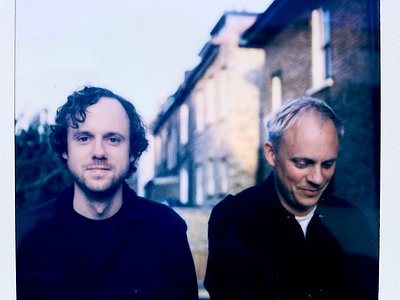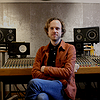Part 2
Take us through a day in your life, from a possible morning routine through to your work, please. Do you have a fixed schedule? How do music and other aspects of your life feed back into each other - do you separate them or instead try to make them blend seamlessly?
I'm fortunate in that most of my work life now is spent making music. My routine is very varied depending on what projects I'm working on, and I like it that way. I also tend to divide my time between touring (less so now than before the pandemic) and the studio, two very different ways of working but which I think complement each other nicely. Aside from that I also have a part-time job for a few hours each week working on Neil Young's Archives in a very minor way, which is super flexible and I'm able to fit around my other work, even if it means doing that in the back of the van on tour.
I feel very lucky to have the freedom to choose how and when I work, most of the time. This weekend for instance I am going to play a gig in Exeter with Psychic Markers, so today (Friday) I am taking it fairly easy, doing some admin and I went for a long walk round Victoria Park this afternoon where we live. I am also not very good at getting out of bed in the morning and being a musician works well with that too.
Can you talk about a breakthrough work, event or performance in your career? Why does it feel special to you? When, why and how did you start working on it, what were some of the motivations and ideas behind it?
I think releasing Europa, which was my first album under my own name and my first instrumental work, in 2019 felt like a bit of a turning point for me. The music was all written for a film of the same name by the Rwandan director Kivu Ruhorahoza. That in itself was a big deal for me as it was the first feature film that I scored, after working on a few shorts. I'd been making instrumental, ambient-ish music for a few years at that point, but I hadn't had the confidence to release anything until then.
The process of making music for film is quite different, in that it forces you to generate a huge amount of ideas and music in a concentrated period of time...much more quickly than I would usually write an album. I was able to come back to the music a few months after I'd made it and listen to it with a sense of detachment, as honestly parts of the process were quite a blur and there was music there that I had no real recollection of making. I think that was the key to me feeling comfortable with the idea of putting the music out into the world as an album and then the positive reception it received gave me the confidence to continue down this path.
There are many descriptions of the ideal state of mind for being creative. What is it like for you? What supports this ideal state of mind and what are distractions? Are there strategies to enter into this state more easily?
I've learnt that for me it's a question of balance. I need to have enough time on my hands to properly immerse myself in a new project, but I've also often found I work best when I'm working on a few different things at the same time...so that I don't feel too much pressure on one project in particular, with all my eggs in one basket. Likewise for the music itself, a completely blank canvas can be slightly paralysing, so I try to create some kind of parameters to work with, but then not to the extent that they feel limiting. It can be hard to achieve that balance, but that's what I'm always aiming for.
Music and sounds can heal, but they can also hurt. Do you personally have experiences with either or both of these? Where do you personally see the biggest need and potential for music as a tool for healing?
I think it's only in the last few years that I've come to appreciate the healing role that music has played in my life. It took me until my thirties to realise that I wasn't very good at expressing my emotions, or in some cases even being fully aware of them myself, and in hindsight I think when I was younger I was drawn to what people might consider 'sad music' like Elliott Smith or Bright Eyes because it was an outlet for those feelings.
More recently I suppose I've come to appreciate the healing quality of ambient music in particular. There is something very comforting about knowing I can put on a piece of music like Brian Eno's Discreet Music and it will always have a calming, comforting effect. In a similar way, when I've toured with the band Still Corners, they often play the same albums in the dressing room before a show in a way that is quite comforting- when you're travelling to a different place every day for a month or so, music can help you find some sense of continuity and familiarity.
There is a fine line between cultural exchange and appropriation. What are your thoughts on the limits of copying, using cultural signs and symbols and the cultural/social/gender specificity of art?
It's an interesting question and, while a lot of musicians might think they have nothing to do with cultural appropriation, anyone operating in a musical world in some way connected to rock and roll is involved in something that has a lot of its roots in cultural appropriation. I suppose there's a parallel there to living in England and in a society built on a colonial past. I guess my approach is to try to make sure my eyes are open to that context and, particularly as a producer, to try and steer people away from those waters as much as possible.
Our sense of hearing shares intriguing connections to other senses. From your experience, what are some of the most inspiring overlaps between different senses - and what do they tell us about the way our senses work?
An obvious choice perhaps, but the impact that music has on film and television still hits me on a regular basis. I can still remember the feeling of watching the reissued Star Wars films in the cinema in the 90s when I was a kid and feeling blown away by hearing that incredible opening music blasting through a huge sound system for the first time. Or recently I was watching the new series of Sex Education and during the finale they played The Ballad Of El Goodo by Big Star, which is probably one of my favourite songs and something I've heard hundreds of times, but it still made the hairs on the back of my neck stand up. I don't know what that tells us about how our senses work, but I like it.
Art can be a purpose in its own right, but it can also directly feed back into everyday life, take on a social and political role and lead to more engagement. Can you describe your approach to art and being an artist?
Although I make my own music, I spend most of my time helping other people make theirs. Throughout my life, most of my closest friendships have involved music in one way or another, whether that's playing music together or bonding over it. Helping someone express themselves through their creativity is a very powerful experience, a real privilege which can form very strong bonds. I think that personal connection is probably my favourite thing about music and what inspires me to keep creating and collaborating.
What can music express about life and death which other forms of art may not?
I don't know if I can really put that into words, but I suppose I agree with the famous quote by Walter Pater that 'all art constantly aspires to the condition of music'.






